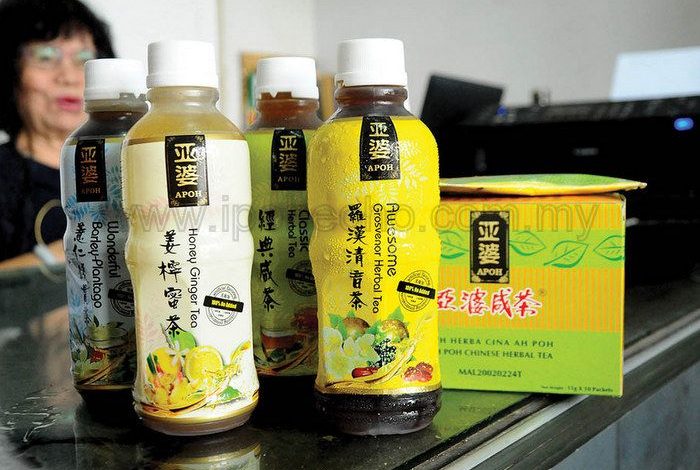

By Chris Teh & Luqman Hakim (pics)
Ipohites have heard of many herbal tea brands like Ho Yan Hor, Tan Ngan Lo, Poh Woh Thong and many more. These are all homegrown brands, using formulations passed down the ages, each one with its own signatures and each appealing to its own audience. Some which were previously featured like Ho Yan Hor in March 16, 2016 (issue 231) and May 16, 2016 (issue 235) and Gaharu Tea in May 1, 2015 (issue 211) and August 16, 2018 (issue 287) have become well known as Ipoh’s signature products that come in handy when recovering from sickness or as remedial concoctions.


But have you heard of Apoh Herbal Tea? The century-old business has been passed down from one generation to another, promoting a healthy body through the consumption of salted herbal tea. Ipoh Echo had an exclusive one-on-one with the director of Sam Tat Trading Company which brews Apoh Herbal Tea that is distributed around town.
How ‘Apoh’ Came to Its Name
The Early Beginnings
Being the third generation of the Cheng’s to run the herbal tea production company, Madam Cheng Khuan Fong reminisced on the hardships her ancestors faced while running the Chinese herb business.


Owing to worsening living conditions in China, her grandmother took off with her three children (Cheng’s father and two uncles) to Malaya and established a Chinese medical hall cum provision store. What was originally dreams of a new life turned into dust in an instant when the Japanese occupation in China indirectly forced her grandmother to return there.
“I was brought up by my uncles who stayed here in Malaya because my father, being the eldest sibling had to return to China with my grandmother to tend to the remaining families and businesses there,” the 82-year-old Madam Cheng mentioned.
Due to the Japanese occupation, the shop in Malaya was destroyed but owing to the determination of Cheng’s uncles, the Chinese medical hall was reopened in Kampar and has since been established in Ipoh and Penang.
Apoh came into existence due to a flu epidemic that broke out during the 1950s. The herbal tea concoction of Cheng’s grandmother came in handy to boost the immune system of those who sought treatment in the shop. Even suitable for children’s consumption, salted lime was added for children’s taste. This formula brought Apoh to what it is today.


Keeping ‘Apoh’ Alive
“I’m currently just maintaining the business,” Cheng stated. “Right now, I’m at that age where I just want to pass time doing whatever I do.”
With only six staff including Cheng herself, the factory in Pengkalan Industrial Area runs in a semi-automated manner. Staff are only in charge of bottling brewed tea and packaging tea bags. The brewing of tea for bottles are already preset on a boiler which automatically channels completely brewed tea to the bottling section.
“I’m holding out hope that my children would inherit the business in the future,” she expressed. “Not mentioning myself, my whole family has been consuming Apoh Herbal Tea. I’ll keep holding on until my children decide to take over the business.”
Consumption for the Busy, Around Town and Beyond
Apoh Herbal Tea has five products which are their signature Classic Herbal Tea, Honey Ginger Tea, Barley-Plantago Tea, Grosvenor Herbal Tea and Burdock Ginseng Tea.
The Classic Herbal Tea contains salted mandarins, honey, liquorice root, lalang grass root and mulberry leaves, best consumed for reducing excessive body heat. It has a greenish yellow-coloured bottle packaging and has an obvious salty taste, which is the signature of Apoh Herbal Tea.


Coming with a beige-coloured packaging, the Honey Ginger Tea contains ginger, orange, lemon and lemongrass which is best consumed for warming up the digestive tract. Due to ginger as one of the ingredients, it has a hint of spiciness.
The Barley-Plantago Tea with light blue-coloured packaging contains barley, grass jelly (commonly known as leong fun), Plantago, honey and Chinese liquorice root. With a mild herbal tea flavour, Madam Cheng highlighted, “It is best consumed for cleansing the excretory system. I highly recommend this for consumption.”
The Grosvenor-Herbal Tea contains monk fruit (commonly known as luo han guo which is usually brewed into herbal tea beverage available in certain old-style coffee shops), chrysanthemum, liquorice root and red dates, featuring a yellow packaging. With an obvious, non-guilty sweetness derived from the ingredients, it is best consumed for protecting the liver.
Yet to be available, the Burdock Ginseng Tea sweetened with stevia has blood-cleansing properties and increases vitality.
Not to worry; all of their products do not contain any artificial ingredients.
“For convenience purpose, we decided to brew Apoh Herbal Tea into bottles owing to the newer generation of people who are constantly busy with their careers or priorities,” Madam Cheng mentioned.
“For the Classic Herbal Tea, there is also a tea sachet variant available,” she said. “Just add hot water, leave it to brew and it’s good to be consumed.”


“We have two separate factories; one is for bottled herbal teas and another one for tea bags packaging,” Madam Cheng stated. “It’s so to comply with the halal certification standards because we would like to appeal to a larger customer base.”
Apoh adheres to the teaching of Compendium of Materia Medica (romanised Bencao Gangmu), a herbology volume written by famed Chinese herbalist Li Shi-zhen during the Ming Dynasty.
“Thankfully, responses from our customers have been positive so far,” Madam Cheng expressed. “We are not in any advertising medium as of now. Our business totally depends on word of mouth and loyal suppliers.
“We mainly stay true to our quality, which is why we are able to withstand challenges and garner loyalty till today,” she added.
According to Ng Ee Ling, production manager for Sam Tat Trading Company, Apoh Herbal Tea is distributed around town to several well-known shops that perhaps are patronised by most Ipohites and even tourists.
“Hai-O Medicine, Yee Hup Confectionery and Lou Wong Bean Sprout Chicken Restaurant are few of the shops around Ipoh which feature our herbal tea products,” she said.
“We have regular vendors from Hong Kong,” Madam Cheng further mentioned. “They come all the way to Malaysia just to purchase stock from us. Interestingly, Apoh Herbal Tea sells really well in Hong Kong and has become one of the many brands of herbal tea there which is popularly consumed.
“There are also vendors coming from East Malaysia that started purchasing from us recently,” she added.


Vendors and Consumers’ Opinion Towards ‘Apoh’
With Madam Cheng as a living example, she said, “I drink two to three tea bags weekly.” No exaggerations involved but with a flawless skin complexion, she does not look like her age at all!
“Apoh Herbal Tea is meant to boost one’s immune system,” Madam Cheng reiterated. “Whenever my friends and family fall sick or are recovering from illnesses, I always give them packets of the Classic Herbal Tea or bottles accordingly to consume. My whole family basically grew up with it.”
Owner of Pak Fook Thong Enterprise, a Chinese herbal shop in town, Kum Chun Khuen said the shop has been selling Apoh Herbal Tea sachet boxes for more than 40 years.
“My father and Madam Cheng are both practitioners of Chinese medicine,” 50-year-old Kum recalled. “They have known each other for quite a long time. Since they are in the same line of business, my father has helped promote and sell her products in our shop until today.”
Tan Mei Kuan, 28-year-old Ipohite who tried Apoh Herbal Tea for the first time said, “I’m glad to see how Apoh is spicing up the herbal tea by creating new concoctions in addition to the classics, thus consumers have more options to choose from to suit their taste buds and dietary requirements.”
Citing Barley-Plantago Tea and Grosvenor Herbal Tea as her favourites, she further stated, “Both remind me of the homemade herbal tonic my mother prepares whenever I am stressed or unwell to improve my overall well-being. Most comfort foods have herbs in them, don’t you think?”
Rose Lim, an Ipohite who works for a confectionery shop in town opined that the ‘Apoh’ brand name sounds special.
“I have heard many variants of tea, herbal or not. But to hear a brand of herbal tea with ‘Apoh’ as its name is quite interesting,” the 45-year-old mentioned. “I usually drink the Classic Herbal Tea whenever my throat acts up. With just the right amount of sweetness, it also helps soothe my throat.”
With the five flavours of herbal tea bottles to complement as a recent addition to Apoh Herbal Tea products, the younger generation should take note too. People of all ages and especially those that frequently burn the midnight oil and exercise less should look into Apoh Herbal Tea for remedial purposes.
Prevention is better than cure.


